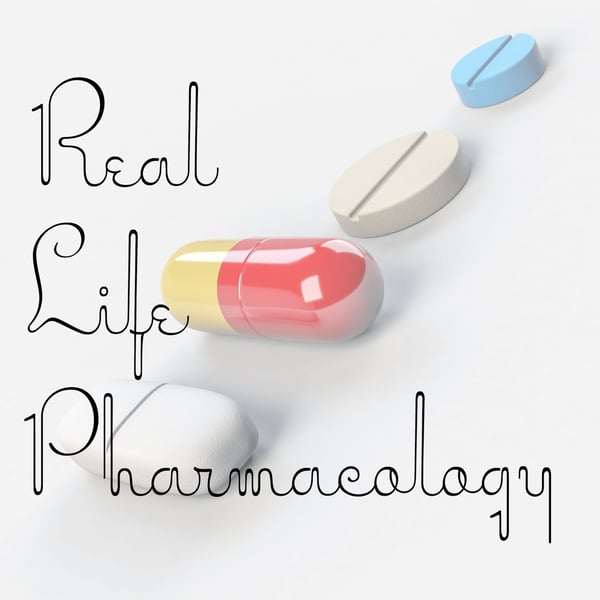Ropinirole Pharmacology
Real Life Pharmacology - Pharmacology Education for Health Care Professionals
Eric Christianson, PharmD; Pharmacology Expert and Clinical Pharmacist
5 • 716 Ratings
🗓️ 16 June 2022
⏱️ 14 minutes
🧾️ Download transcript
Summary
Dopamine agonists like ropinirole can worsen psychiatric symptoms in some patients by causing hallucinations, and obsessive/compulsive symptoms.
Nausea, vomiting, hypotension, and fatigue are the most common adverse effects of ropinirole.
Ropinirole has drug interactions with antipsychotics and CYP1A2 inhibitors. I discuss these in greater detail in this podcast episode.
Transcript
Click on a timestamp to play from that location
| 0:00.0 | Hey all, welcome back to the Real Life Pharmacology podcast. I'm your host, pharmacist, Eric Christensen. |
| 0:05.3 | Thank you so much for listening today. Go check out RealLife Pharmacology.com. Get your free study guide on the top 200 drugs. |
| 0:14.4 | Simply in email, we'll get you access to that free resource. And obviously, we'll get you updates when we've got new podcasts available as well as other new |
| 0:24.6 | content. |
| 0:25.3 | So go check that out at real-life pharmacology.com. |
| 0:30.5 | All right, the drug of the day today is ropineral or brand name Requip. |
| 0:37.3 | This drug is classified as a dopamine agonist. |
| 0:43.0 | With that said, what dopamine receptors, from a mechanism of action standpoint, does |
| 0:48.7 | ripinerol bind? It primarily binds D3 receptors, but it also does have some binding to D2 receptors. |
| 1:03.2 | So if you remember mechanistically and from a drug class perspective, antipsychotics block dopamine 2 receptors. |
| 1:14.4 | And a drug like repineral actually activates or agonizes. |
| 1:20.5 | It stimulates the D2 receptor. |
| 1:23.8 | So these two drugs can really kind of cause opposing type effects. |
| 1:30.1 | So that's definitely an important thing to remember. |
| 1:32.6 | And if you can remember some of the adverse effects of antipsychotics, you can expect, |
| 1:37.9 | or what the antipsychotics treat, you can expectropineral to have some of the opposite type activity. And we'll get into that when I talk about |
| 1:47.2 | adverse effects, especially. All right, let's talk about indications. So first and foremost, this |
| 1:56.9 | drug was, I believe, initially created to manage Parkinson's symptoms. |
| 2:02.5 | Having that dopamine action, remember Parkinson's, it's a lack of dopamine action in the brain. |
| 2:10.2 | So it makes sense that ropeinerol could potentially be helpful for Parkinson's. |
| 2:15.0 | Now, with that, Carbidopal Leavidopa is really the gold standard for treatment of Parkinson's. Now, with that, Carbidopaliva is really the gold standard for treatment of Parkinson's, |
| 2:20.4 | so in my practice, I really don't see it used very often for Parkinson's disease. The other primary |
... |
Please login to see the full transcript.
Disclaimer: The podcast and artwork embedded on this page are from Eric Christianson, PharmD; Pharmacology Expert and Clinical Pharmacist, and are the property of its owner and not affiliated with or endorsed by Tapesearch.
Generated transcripts are the property of Eric Christianson, PharmD; Pharmacology Expert and Clinical Pharmacist and are distributed freely under the Fair Use doctrine. Transcripts generated by Tapesearch are not guaranteed to be accurate.
Copyright © Tapesearch 2025.

